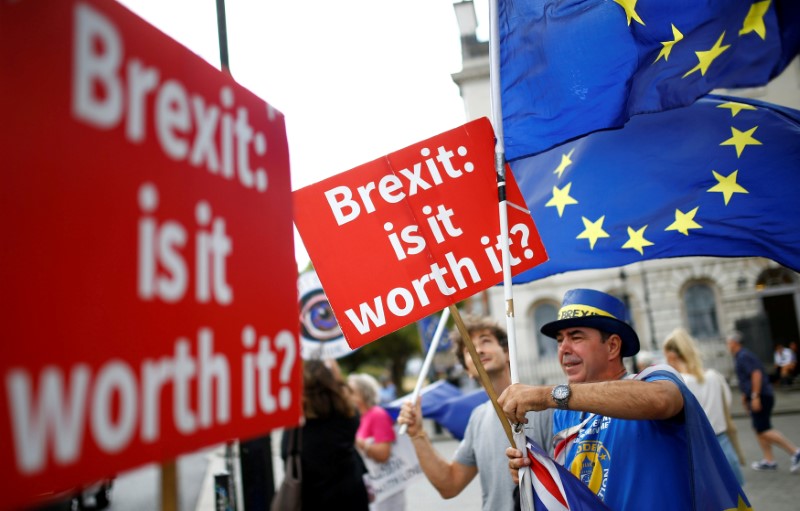By David Milliken
LONDON (Reuters) - European Union countries will suffer long-term damage equivalent to about 1.5 percent of annual economic output if Britain leaves the bloc without a free trade deal next year, the International Monetary Fund said on Thursday.
Britain is due to leave the EU on March 29 next year, and Prime Minister Theresa May has yet to reach a consensus within her own Conservative Party on what future ties with the EU should look like, let alone broker a final deal with the EU.
The EU's lost economic output in the case of no deal would cost the bloc around $250 billion, according to Reuters calculations based on the IMF's estimate of the size of the EU economy excluding Britain this year.
Lost employment could total 0.7 percent of the EU workforce, or more than a million jobs.
The timing of the losses would depend on the length of post-Brexit transition arrangements, but would probably take five to 10 years at least to be fully felt, the IMF said.
While Britain and the EU agreed the outlines of a transition plan in March to largely preserve the status quo until the end of 2020, this deal has not been ratified and risks falling apart if there is no agreement on longer-term goals.
"The strength of the euro area-UK integration implies that there would be no Brexit winners," the IMF said.
Ireland would be worst hit due to its close trade ties with Britain, followed by the Netherlands, Belgium and Luxembourg. Germany would also suffer due to industrial supply chains.
Looking at the trade impact alone, Ireland could lose almost 4 percent of its economy in a 'no deal' Brexit, but some big countries like France, Italy and Spain would be far less hurt.
Britain has argued it is in the EU's economic interest to take a flexible approach to Brexit, while the EU is concerned not to set a precedent of allowing a country to leave but retain the aspects of EU membership it finds beneficial.
Some British lawmakers say the country should leave the EU and trade on World Trade Organization terms - the IMF's 'no deal' scenario - if the EU makes too few concessions.
The IMF said its study showed a bigger negative impact on the EU from Brexit than some previous work, because it modeled the disruption to manufacturing supply chains as well as the effect of tariffs and reduced financial services trade.
The Washington-based body also urged the EU to continue to allow London-based 'central counterparties' (CCPs) that clear global financial trades to handle euro transactions - something the European Central Bank has resisted previously.
"The potential forced relocation of a globally systemically important CCP to the EU should be viewed with great hesitation," the IMF said.
The economic damage from Brexit would be minimal if Britain were to adopt the 'soft Brexit' Norwegian-style model of being part of the European Economic Area, which May has rejected as it would largely require Britain to stick to EU rules.
A free trade agreement for manufactured goods - which is closer to what May is seeking - would reduce long-term EU losses to 0.8 percent of GDP, or around $130 billion.
The IMF did not estimate the costs of Brexit for Britain in this paper, which accompanies a two-yearly assessment of the EU, though earlier this week it downgraded its forecast for British growth this year to the weakest since 2012.
Before Britain voted to leave the EU, the IMF warned of a possible recession under an 'adverse' scenario, drawing criticism from Brexit supporters.
Earlier this year Bank of England Governor Mark Carney said Britain's economy was around 1.5-2.0 percent smaller than it would have been if the public had voted to stay in the EU - not far from what the IMF forecast for a 'limited' Brexit scenario.
